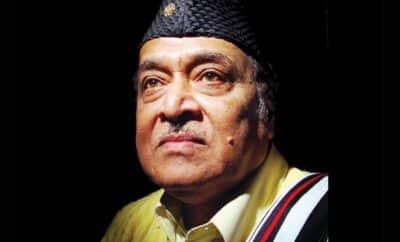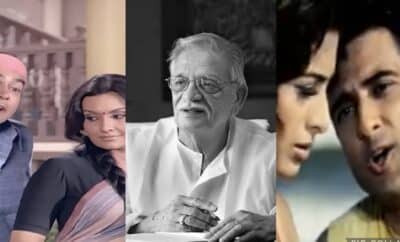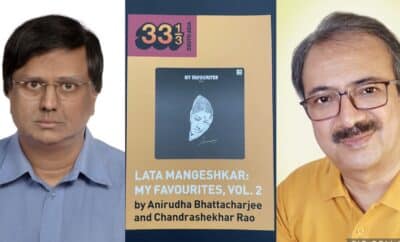Collections
Petrichor of Marathi Soil in Vasant Desai’s Music
Almost right from the inception, Bombay (now Mumbai) came up as the home base of Hindi cinema, which thrived there phenomenally, so much so that Bombay and Hindi cinema became inseparable from each other. While Hindi cinema was prospering in Mumbai, its close sibling – Marathi cinema – also started taking baby steps and grew up in Kolhapur as well as in and around Mumbai. The interchange of ideas and artists was therefore an obvious and inevitable consequence. Quite a few Marathi artists got a chance to deploy their talent and rose to fame in Hindi films. Vasant Desai was one of such Marathi composers, who made big name for themselves in HFM. Well known for melodious tunes based on classical and folk music, filled with simplicity and purity, he is regarded as one of the finest composers of Hindi and Marathi cinema. Born on 9 June 1912 in the southern part of coastal Maharashtra, he started his career with the maestro V. Shantaram in the early ‘30s as an all-in-one helping hand in his studio with an ambition to become an actor. He even got a lead role in the silent movie Khooni Khanjar (1930). However, due to some events thereafter, his career took a different turn and he ended up embracing music as his full-time career.
Vasant Desai composed his first soundtrack for Master Vinayak’s bilingual (Marathi and Hindi) film Chhaya (1936). However, due to the contractual obligations with Prabhat Studio, he was not acknowledged in the film’s credits. Shobha (1942) was the first film to officially credit him as the music director. Besides these films, he composed musical scores for quite a few V. Shantaram films in Hindi as well as Marathi.
Though the credit of recording Lata Mangeshkar’s first Hindi song (for a Marathi film Gajabhau – 1943) and first Hindi playback (Aap Ki Seva Mein – 1947) goes to Datta Davjekar, Vasant Desai was the one who recorded Lata Mangeshkar’s first Hindi song for a Hindi film Jeevan Yatra (1946). However, the song was picturised on Lata Mangeshkar herself and was not a playback technically.
Though he also composed music for many leading production houses in Marathi and Hindi besides his mentor V. Shantaram, he remained ardently loyal to V. Shantaram. This was an important reason why he could not make it to the first row of commercially successful composers. Nonetheless, both Hindi and Marathi film music lovers would always remember him forever for his saccharine compositions.
Unlike many Marathi artists, who flourished in Hindi cinema and have left no or only sporadic footprints in Marathi cinema, Vasant Desai did a fair justice to his mother tongue by composing music for quite a few Marathi films. Marathi people have therefore been privileged to enjoy the double bonanza of his music. Let us take a quick ride through his Marathi repertoire which is no less in quality and sweetness than his Hindi repertoire.
1. Ghanashyam Sundara (Amar Bhoopali – 1951)
Though Vasant Desai had been scoring music for Marathi films since the ‘40s, Amar Bhoopali (1951), produced and directed by V. Shantaram, was perhaps his first highly noticed work in Marathi. The film is based on the life of a well-known 19th century Marathi poet Honaji Bala. The Bhoopali (kind of a prayer sung in the mornings in Maharashtra) “Ghanashyam sundaraa shreedharaa, arunodaya zhala” (a wake-up call to Lord Krishna) from this film attained immense popularity. The Bhoopali has become really “amar”, as the day of many Marathi families starts with this Bhoopali even today.
While the central character Honaji Bala (played by Panditrao Nagarkar) is on the deathbed, the sun is rising in the east. Looking at the rising sun, he gets a creative impulse even during his last breaths, and completes the hitherto incomplete Bhoopali, which he had been struggling to complete at his mother’s behest.
Vasant Desai’s composition in the early morning raag Bhoop (Bhupali) with touches of raag Deshkaar creates a pleasant morning aura around us. Honaji Bala has beautifully painted a word-picture of a blissful morning through his lyrics. The song is sung by Lata Mangeshkar and the protagonist Panditrao Nagarkar. Lata Mangeshkar’s nascent yet sweet and mature rendition coupled with Panditrao Nagarkar, who was also an accomplished vocalist takes the composition several notches up.
The film was also made in Bengali, and the Bengali version of the song was sung by Lata Mangeshkar and Manna Dey.
The Bhoopali has also a non-film version in Kannada based on the same tune, which is sung by Manna Dey and Lakshmi Shankar.
2. Bharzari Ga Pitaambar Dila Phaadun (Shyamchi Aai – 1953)
The film is based on the celebrated Marathi book Syamchi Aai (Shyam’s mother), the autobiography of social activist Pandurang Sadashiv Sane (popularly known as Sane Guruji). The book narrates how Shyam’s mother taught him the importance of sticking to one’s ideals, whatever be the situation. The film won the President’s medal as the best feature film in the first National Film Awards ceremony in 1954.
The song narrates a story from Mahabharata – once when Lord Krishna got a cut on his finger, Draupadi tore a piece of her precious saree and wrapped it around the wound; and Krishna started considering her as his sister thereafter. The story is converted into lyrics in simple words by the director of the film, P.K. Atre, a renowned writer, poet and educationist in Maharashtra. The simple yet mellifluous song composed by Vasant Desai is rendered by Asha Bhosle in a honeyed and touching voice. The song is filmed on Shyam’s mother (played by Vanamala Bai) singing the song with ladies in the household while relaxing for a while after a tiring day.
3. Mi Tujhi Ka, Ka Tujhi Re? (Kanchan Ganga – 1954)
The film was produced by Lata Mangeshkar under the banner Surel Chitra. The euphonious Lata- dominated soundtrack is composed by Vasant Desai and the lyrics are penned by the renowned Marathi lyricist P. Savlaram.
The song “Mi tujhi ka, ka tujhi re?” (Am I yours? Why am I yours?) starts with a fast paced and effervescent first stanza, in which one of the protagonists Usha Kiran is dancing with joy because she has fallen in love. The song becomes a slow-paced poignant number in the second stanza at once, wherein dejected Kusum Deshpande (another heroine) is lamenting her heartbreak. Vasant Desai has achieved this transition so smoothly that the listeners are automatically transported to the sad part, without a single jerk. And see how Lata Mangeshkar has adeptly changed the mood and tone of her rendition to suit the contrasting moods in a single song!
The film also has a beautiful classical song Shyam Sundar Roop Nayan Rajeev , again rendered by Lata Mangeshkar with her astounding proficiency.
4. Hasle Aadhi Kuni – Tu Ka Mi? (Molkarin – 1963)
Molkarin (maid) is the ironic story of an uneducated, unfortunate and hapless mother (played by Sulochana), who ends up working as a maid in the house of her educated son (Ramesh Dev), who has estranged her. The soundtrack of the film composed by Vasant Desai has several melodic songs, most of which are sung by Asha Bhosle.
It has a lovely romantic duet – “Halse aadhi kuni – tu ka mi?” (Was it you or me, who laughed first?) – filmed on Ramesh and Seema Dev. The beautiful couple on the screen with Vasant Desai’s sweet tune and gleeful orchestration and P. Savlaram’s simple yet befitting words make it a pleasurable composition.
The singers are Asha Bhosle and Talat Mahmood –one of the few songs that Talat Mahmood has rendered in Marathi. While Asha Bhosle’s versatility knew no bounds, Talat Mahmood was a perfect fit also for such romantic songs, besides the niche of melancholic songs and ghazals that he had carved out for himself. Both of them sound so sweet and pleasant in this song!
Other noteworthy songs from the soundtrack are Kashi jhokaat chaalali kolyachi por, a frisky and youthful stage song by Asha Bhosle and Daiva janeele kuni?, a soulful song by Lata Mangeshkar.
5. Jinku Kinva Maru (Chhota Jawan – 1963)
Chhota Jawan is another social drama film released in 1963, with the soundtrack composed by Vasant Desai. Actor Sachin (Pilgaonkar) and the famous Marathi director, producer and actor Mahesh Kothare worked together for the first time in this film as child artists.
The soundtrack has an inspirational patriotic song Maanuskichya shatru sange yuddha aamuche suru (Our war against the enemy of humanity begins), penned by the veteran Marathi lyricist G. D. Madgulkar and rendered energetically by Mahendra Kapoor. The composition invariably arouses patriotism in the minds of the listeners. One gets to hear the song in Maharashtra in the Independence Day and Republic Day celebrations every year even today.
The soulful Asha solos Dhaav paav savale vithai and Yaal kadhi ho ghari are two other songs from the soundtrack that deserve a mention.
6. Ramya Hi Swargahun Lanka (Swayamvar Zhale Seeteche – 1964)
Swayamvar Zhale Seeteche is a costume drama film based on Seeta Swayamvar from Ramayana. The film has an Asha dominated soundtrack composed by Vasant Desai, the lyrics of which have flown from the prolific pen of the eminent lyricist G. D. Madgulkar, popularly known as Aadhunik Valmiki (Valmiki of the current era).
Besides the beautiful Asha numbers, the soundtrack also has a song sung by the veteran classical vocalist Pandit Bhimsen Joshi – Ramya hi swargaahun Lanka (Lanka is more beautiful than heaven). Pandit Bhimsen Joshi is reported to have sung only for seven films in his lifetime, and this is one of them.
The song is filmed on Ravana (played by Chandrakant Mandhre), who is boasting his kingdom Lanka and its richness and glory. The classical composition is based on raag Hindol. As it is rendered by a stalwart like Pandit Bhimsen Joshi, we better listen to and enjoy the ethereal rendition, rather than deciphering it.
https://www.youtube.com/watch?v=xsz–Nt-u5g
7. Runanubandhaachya Jithun Padlya Gaathi (Dev Deenaaghari Dhaavla)
Another form of music that is close to the hearts of Marathi music lovers is Natya Sangeet (dramatic music). It has been the soul of Marathi theatre right from the beginning. Natya Sangeet had come into being long before film music; and Marathi theatre saw the golden era of music with the legends like Balgandharva, Deenanath Mangeshkar and Keshavrao Bhosle. However, the evolution of the silver screen proved to be a setback for Sangeet Natak (musical dramas) and it went almost extinct.
Apart from film music, Vasant Desai also composed music for 14 Marathi plays (notable among which are Panditraj Jagannath, Jay Jay Gauri Shankar, Preeti Sangam and Dev Deenaghari Dhaavla) and breathed a new life into the almost lifeless Natya Sangeet.
The play Dev Deenaghari Dhavla (God rushed to help the poor) has an outstanding romantic composition by Vasant Desai based on Raag Pahadi Runanubandhachya jithun padlya gaathi (Where the knots for life were tied). The lyrics are written by the playwright Bal Kolhatkar and the classical genius Pandit Kumar Gandharva has sung it together with Vani Jayaram. The song is an extraordinary aural treat.
The play also has a fantastic Bhoopali Uthi uthi Gopala based on raag Bhoop sung by Pandit Kumar Gandharva.
This is just a representative sample of Vasant Desai’s mellifluous Marathi repertoire and there is a lot more to it. Though non-Marathi readers may not be able to understand the lyrics, there should be no hindrance in enjoying these musical gems due to several relatable factors like Vasant Desai himself and the voices of all the well-known singers that we have been adoring and cherishing across generations. After all, music is a universal language in itself!




Sharvari Khatavkar
June 9, 2021 at 9:47 am
Very well written article and nice choice of songs.
Yogesh Kale
June 9, 2021 at 4:02 pm
Thanks, Sharvari ji!
Vikas Desai
June 9, 2021 at 12:03 pm
Excellent article. ….. brings out the scope & depth of VASANT DESAI’s creativity … he passed away in 1975 but these songs are still an integral part of the life of Marathi people … they are honest compositions coming from his soul to reach your inner being ……… & the film he was supposed to be the hero of was the milestone film “MANUS”…..
Well done, YOGESH KALE
Yogesh Kale
June 9, 2021 at 4:01 pm
Thanks, Vikas ji! “Honest compositions coming from his soul to reach your inner being” – very apt description.
Yes, loss of the lead role in Manus compelled him to take up music as full time career.
Amogh
June 9, 2021 at 3:55 pm
Excellent information put in correct words. Very helpful.
Yogesh Kale
June 9, 2021 at 4:03 pm
Thanks, Amogh!
Sagar Jha
June 10, 2021 at 1:53 pm
Beautifully written. Reading it is like taking a glimpse behind the curtains of these songs and music. The mini stories about the movies and songs shared in the article are like icing on the cake. Pure gold for all cinephiles. Take a bow Yogesh. Looking forward to reading more of your work.
Yogesh Kale
June 11, 2021 at 9:06 pm
Thanks a lot, Sagar!
Pratik
June 9, 2024 at 11:12 am
Thank you for a lovely write up. Have very little of his great composer. Will surely start off with the songs recommended. Thank you once again